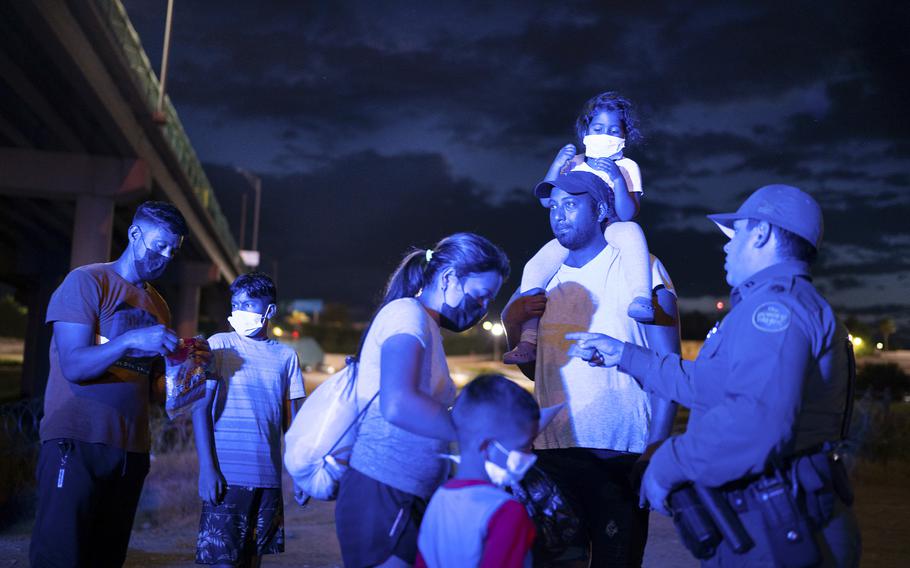
A Venezuelan family is instructed by a Border Patrol officer near the Eagle Pass-Piedras Negras International Bridge shortly after crossing the Rio Grande on Aug. 12, 2022. (Sarah L. Voisin/Washington Post)
DEL RIO, Tex. — They marched in caravans for weeks, past dead bodies while dodging kidnappers and thieves - and now, some of the migrants crowded inside a tiny stucco building just past the Rio Grande were looking at a star scribbled on an envelope carrying their U.S. asylum petitions.
Courtesy of the state of Texas, this meant they qualified for a free bus ride to a place that has been largely unprepared to receive them: Washington, D.C.
"They're going to give you food," a Spanish-speaking volunteer at the Val Verde Border Humanitarian Coalition temporary "respite center" said about the state-chartered buses, talking to the migrants who earlier in the week had surrendered themselves at the border to U.S. immigration officials. "It has WiFi, so you can connect with your families."
So far, more than 230 buses carrying nearly 9,400 migrants, including families with young children, have arrived in D.C. since Texas Gov. Greg Abbott (R) began offering free passage to the nation's capital in April, with Arizona Gov. Doug Ducey (R) following suit in May. Last month, buses from Texas started heading to New York and Chicago, too.
Abbott and Ducey, along with many other Republicans, are focusing increased attention on the record number of border crossings by large groups arriving from South and Central America, and as far away as Senegal. Both governors are using the busloads of migrants as a political statement about what they have called lax Biden administration border policies.
But for many of those who have accepted the rides, any political gamesmanship has been irrelevant. The buses have turned into a welcomed pipeline, given that many already had plans to head east, either to live in the D.C. area or somewhere else another bus ride away.
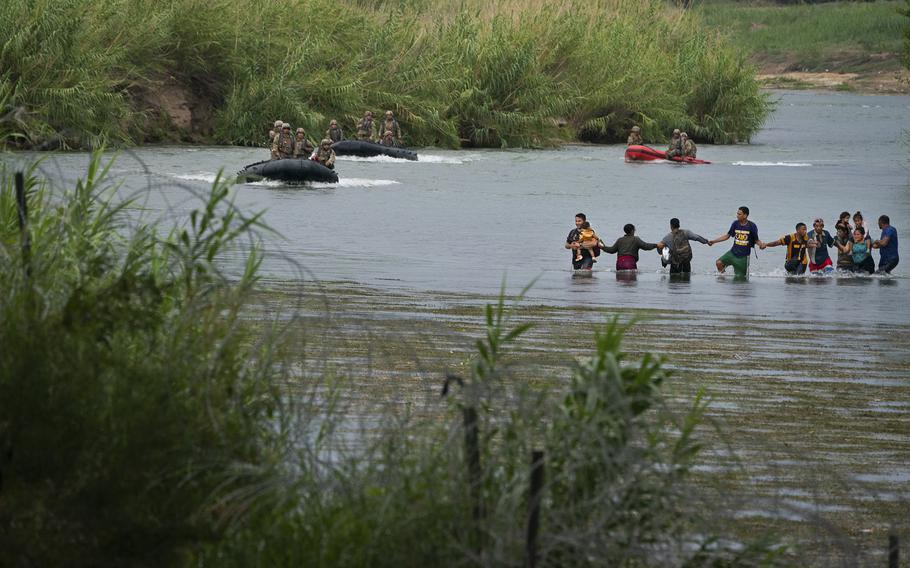
Migrants, including families with small children, join hands to fight the current as they wade across the Rio Grande near the Eagle Pass-Piedras Negras International Bridge in Eagle Pass on Aug. 12, 2022. (Sarah L. Voisin/ Washington Post)
In the process, their arrival has turned D.C. into "an unofficial border town," said Tatiana Laborde, managing director of SAMU First Response, one of the agencies helping the migrants.
With buses letting off more migrants near Union Station several times a week and D.C. Mayor Muriel E. Bowser (D) and the Biden administration at odds over who should do more to help them, the existing apparatus of support is in triage mode, Laborde said.
"It's been intense," she said, in between attending to recently arrived migrants staying inside a temporary shelter run by her organization in Maryland that holds 50 people at a time. "It's something that we are not used to."
An empty D.C.-bound bus waited outside the Val Verde center, its "Norteño Express" sign facing the shuttered businesses and weathered houses that line the way toward a popular border crossing point at the Rio Grande.
Tiffany Burrow, director of operations for the faith-based center, was inside hurriedly sorting through case folders - each representing someone who had just arrived from a nearby federal processing center. More men, women and children were already inside a small holding area, preparing to board the bus, which could hold about 52 people.
When the Val Verde center opened in 2019, Burrow and her two volunteer staff members helped about 25 migrants a week, offering sandwiches, water and a few hours of rest while helping them figure out how to get where they needed to go.
Now, they can see as many as 1,000 or more per week, Burrow said. Her remote city of about 38,000 residents - about 150 miles west of San Antonio - saw 16,000 newly arrived Haitians camped below the International Bridge last fall because they couldn't afford transportation out of Del Rio. And there is no infrastructure for them to stay put.
"You all need to understand that there is no overnight shelter here, there is no funding here, and there is no waiting for people here," Burrow told one group through a Spanish translator. She stood in front of a large wall map of the United States, pointing out destinations to the migrants, who lined up according to where they earlier told federal immigration authorities they intended to go.
"This is California," Burrow said, guiding her pointer to the state. "Florida? Here."
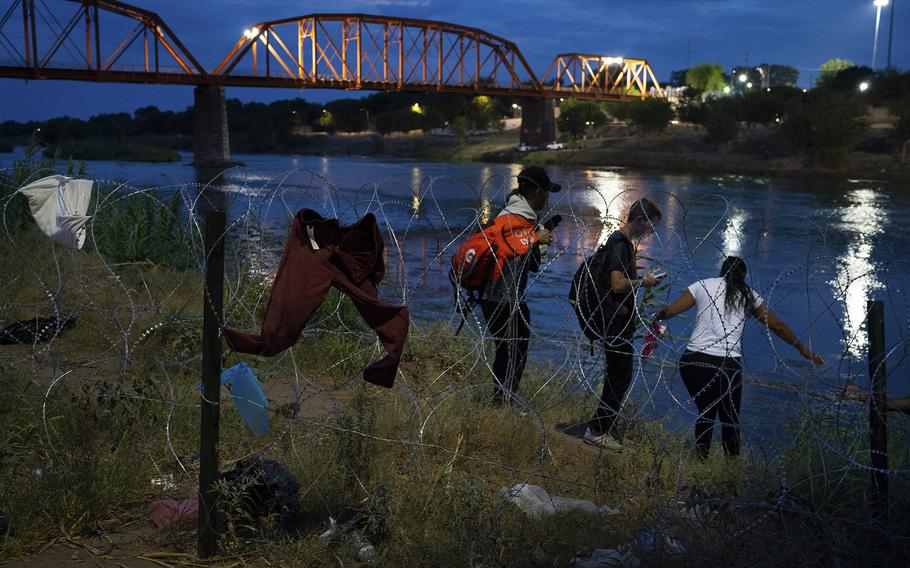
Migrants walk along the Rio Grande in the United States near the Eagle Pass-Piedras Negras International Bridge on Aug. 12, 2022, minutes after wading across the river from Mexico. They later turned themselves into Border Patrol and were transported to a nearby government processing center. (Sarah L. Voisin/Washington Post)
Initially wary of the politics connected to Abbott's bus program, Burrow now considers the free rides a practical way to get as many migrants as possible to their destinations - an expense her agency can't afford to cover with about $200,000 in donations every year that mainly pay for food, clothing and medicine.
The state-chartered buses offer the migrants a way to get closer to their final destinations - or, at least, out of Texas, where border communities have been overwhelmed, the governor has said. So far, Abbott's administration has spent more than $12 million on the bus trips, with the governor raising about $303,000 in private donations to help defray the costs.
Once it had enough passengers, the D.C. bus would leave the center for the hour's drive to Eagle Pass, another border town near where as many as 530 people at a time have surrendered themselves to immigration officials. There, another nongovernmental organization was also helping with travel arrangements and, with the bus waiting outside, mentioning the option of a free ride east to anyone who might need it.
Many arrive in Texas with plans to meet up with family or friends in various parts of the United States, including the D.C. region. Others have no connections in the country, little, if any, cash and not much of an idea of where to settle while awaiting their asylum court dates, which are scheduled in the areas of the country where they say they will live.
But those who board the buses appear do so willingly, with no sign of anyone at the Val Verde center being forced or tricked into going to D.C. or New York - despite claims from Bowser and New York Mayor Eric Adams (D), who've each accused Abbott of using the migrants as political pawns.
But there is confusion. For example, each bus stops for fuel or to change drivers about six times before arriving in D.C. Initially, the migrants were told they could get off at the stops if they intended to settle in states along the way, such as Tennessee and North Carolina, or, even states farther away from the route, like Florida and Illinois.
But the routes are no longer predictable due to inclement weather, so figuring out where to get off is a guessing game, said Burrow, adding that most who take the bus now are bound for D.C. or New York.
That includes Joán Rojas, 29, and Angel Zárraga, 25, who arrived in Texas in mid-August with plans to settle in the D.C. area.
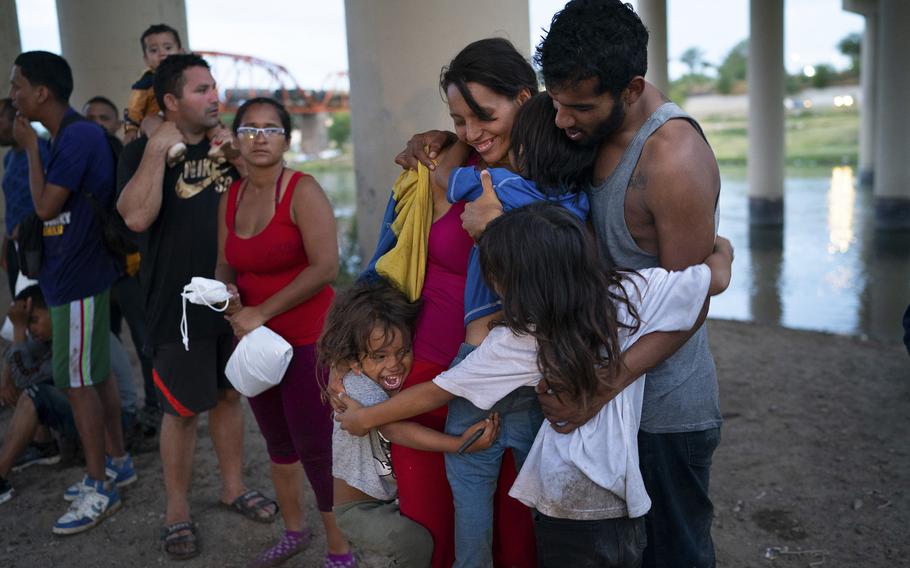
Brismar Romero, center, of Venezuela, and her husband, Jesus Uranga have a celebratory family hug in Eagle Pass shortly after crossing the Rio Grande into the United States on Aug. 12, 2022. (Sarah L. Voisin/Washington Post)
The two Venezuelans each said they heard about the free D.C. bus from friends, who had traveled ahead of them and reported back that it went well. But they didn't know where those friends were staying or whether they could offer any help.
"If he has found some stability, he can help, just to give me something to fight with," Rojas, an aspiring psychologist who hopes to earn money to support a wife and other family members in Venezuela, said of his contact. "We'll see what happens."
Rojas, Zárraga and a third Venezuelan national sat inside a storefront church in the District's Park View neighborhood, with no place to sleep that night.
Their bus had arrived in the nation's capital at around midnight four days earlier, after a monotonous 32-hour journey through the southern U.S. countryside, broken up by meals of preserved beef or crackers in the military MRE dinners handed out during the trip.
After staying in the SAMU respite center for three nights - the maximum allowed - the men were now on their own. The pastor of the church - part of a network of secondary aid in the region - had retrieved them, agreeing to give the men an air-conditioned place in the summer heat to figure out their next move.
"In reality, I planned to go to Florida or New York," said Zárraga, in Spanish, as Rojas sat in another room trying to reach his friend on a smartphone that still had service from Mexico. "But I heard [from that friend] that, in Washington, they care for immigrants a little more and that they would help."
Like many arriving Venezuelans, Zárraga began his trip north from Colombia, where in 2019 he had initially escaped from the government-sanctioned violence consuming his country - aimed particularly at young men like him during massive protests geared toward pushing President Nicolás Maduro out of power.
His group passed corpses in the jungle and he nearly drowned in an unexpectedly strong Rio Grande current while crossing with three other men near Eagle Pass. In Mexico, Zárraga said, an immigration official beat him and then smiled after the diminutive Venezuelan wordlessly bore the abuse.
"I couldn't say anything because they could invent something and deport me," he said.
The pastor - who spoke on the condition of anonymity because he feared for the safety of the migrants and his congregants - eventually took in the three men for the night after it became clear they had no other viable options.
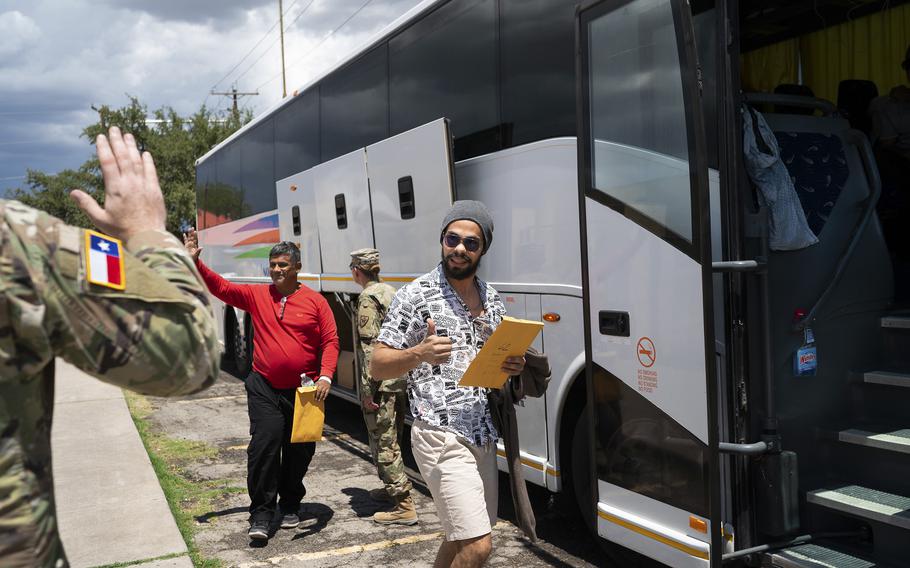
Migrants wave goodbye to the National Guard as they board a D.C.-bound bus outside of the Val Verde Border Humanitarian Coalition in Del Rio, Tex., on Aug. 11, 2022. (Sarah L. Voisin/Washington Post)
Their predicament reflected what immigrant advocates say is a growing problem with longer-term housing and other services as the number of buses grows. Though many migrants have moved on since landing in D.C., an increasing number - approaching 15 percent - are choosing to stay, advocates say.
Clusters of migrants with no other place to sleep after receiving initial support have slept under a pavilion outside Union Station until aid groups are able to connect them with another accommodation.
Others have camped out in the parking lots of the hotels where many of their travel companions have been placed by members of the Migrant Solidarity Mutual Aid Network, a coalition of groups that along with SAMU has greeted most of the arriving buses.
The coalition and other advocates have pushed for the Bowser administration to use city resources or apply for FEMA funding to provide housing and other services.
The city's Department of Human Services provides some support, including sending Laborde's organization coronavirus test kits and helping migrants who want to leave the city get to their next destination.
Bowser has so far avoided dedicating more local resources to the situation.
But, after the Pentagon denied for a second time her request to have National Guard troops take over the aid effort, the mayor said her administration plans "to ensure that when people are coming through D.C. on their way to their final destination that we have a humane setting for them."
Last month, D.C. Attorney General Karl A. Racine (D) announced that his office would spend $150,000 to help the migrants through September, in the form of grants to local groups. His office awarded the grants this month to six agencies.
A Department of Homeland Security spokesman said the Biden administration has been communicating with Bowser about additional funding.
What happens over the long term for people who plan to stay is still uncertain, though several aid groups are discussing plans for a more extensive resettlement program, said Laborde, whose Montgomery County site provides three warm meals per day, internet access and a bed in a congregate setting for three nights.
School districts in the area are enrolling migrant children in classes for the fall, but many of those families are either living in hotels or don't have a fixed address.
Moreover, most of the migrants have not talked to an attorney or case workers about their asylum petitions and, with court dates arriving, are clueless about their next steps, advocates say.
"One of the biggest falsehoods that the mayor and her office is spreading is that people are just coming here as a stop," said Ashley Tjhung, an organizer with the Mutual Aid Network. "There are so many long-term services that are needed."
Kennely Maike-Christie, 23, stared helplessly at a U.S. Immigration and Customs Enforcement notice in English advising her to appear at the end of the month at the agency's offices in New York, about 230 miles away.
"Do you know what this says?" she asked in Spanish, as a group of about 10 Venezuelan and Nicaraguan children played in a parking lot near her hotel room in the northeastern area of the District.
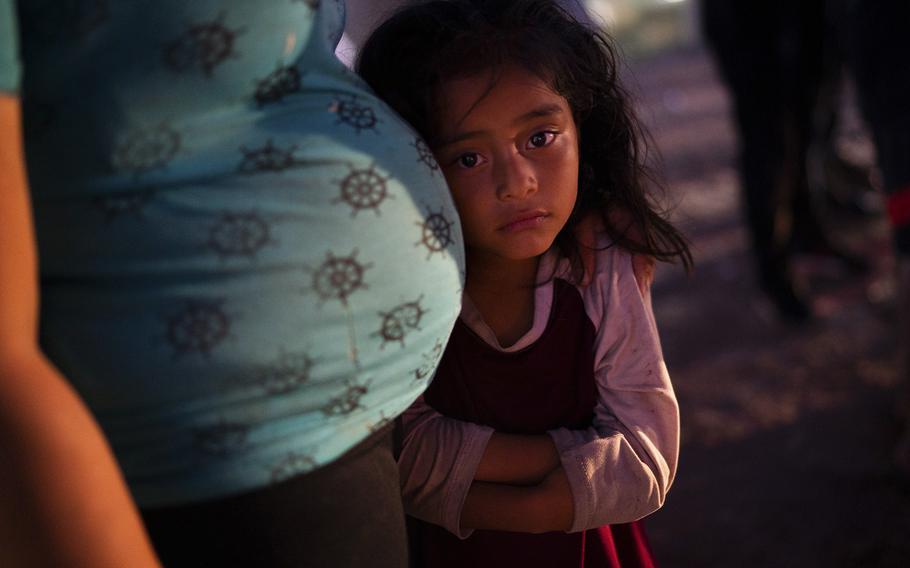
A young Guatemalan girl leans on her mother’s pregnant stomach in Eagle Pass. (Sarah L. Voisin/Washington Post)
Maike - a member of the Indigenous Miskito people on the Caribbean coast of Nicaragua - arrived in the District in July on a bus from Texas, where she received the now-wrinkled ICE notice in her hand. She doesn't speak English, and even her Spanish is limited.
She and her husband, Andy Urbina-Pasquier, 24, left their fishing village with two other relatives after receiving death threats for their activism against Nicaraguan government-sanctioned attempts by land speculators in their oil-rich region to displace their people.
The decision to leave was easy after Hurricane Iota leveled the area in 2020, leaving the water without enough fish to catch.
They all got separated at the Texas border, where the two relatives remain detained because they had no proof of identity. Somehow, Maike's paperwork said she'd be living in New York while her husband was given an ICE appointment in Northern Virginia.
The couple boarded the D.C.-bound bus when they were reunited inside the respite center in Eagle Pass.
"The military said: 'If you don't have family to receive you, go to Washington. The trip is free,'" Urbina said, referring to a member of the Texas National Guard helping with security at the center.
With no jobs, they relied on donations from Mutual Aid Network volunteers who came by three times a day, one of whom was now knocking on their door to ask if they'd like some custard.
"How many?" the volunteer said in halting Spanish.
"Three," Urbina said, tucking the extra serving away for later before he and his wife dug into the treat.
Their situation was becoming more urgent, he said. After 10 days in the hotel, they were informed they'd have to leave soon.
"We don't have a trade for work," Urbina said, apologetically. "We live off fishing."
A few doors down, Alejandra Pinto, 32, swept the walkway outside her room while her son, 11, and daughter, 4, played with the other children.
She and her husband David Hernandez - a former Venezuelan soldier - took the children out of their country three years ago, leaving behind another son, 9, with lung problems as they headed for Colombia. Hernandez, 28, said after he had refused to obey an order to roust a family suspected of being sympathetic to the anti-Maduro movement, he learned he and his family would instead be "disappeared."
They left Colombia after job prospects grew worse there, traveling by foot through the jungle, then on the freight train through Mexico known by migrants as La Bestia - "The Beast" - because of the high risk of being preyed upon by gang members, the intense heat and the tendency for people to fall off at high speeds.
Pinto said she learned of the D.C.-bound buses from a church pastor in Laredo, Tex., who helped the family get to Eagle Pass.
In D.C., the family slept outside Union Station for four days before Hernandez's brother, also a recent arrival, connected them with a Mutual Aid volunteer who paid for their hotel room.
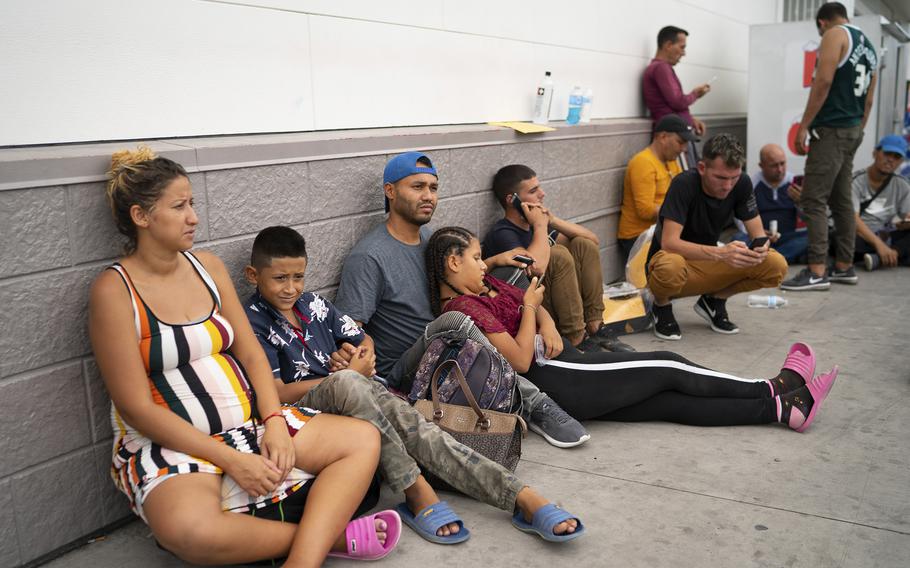
After leaving the Val Verde center, migrants wait at a gas station. Many boarded a greyhound bus to San Antonio, but these migrants did not have a plan or a place to sleep. (Sarah L. Voisin/Washington Post)
Now, Pinto and Hernandez both work at a construction site, saving up their money to find a more permanent home. Pinto, who recently filled out school enrollment paperwork for her kids, said she could see settling into the region for good. More family members were on their way, including a brother who recently lost a leg in a motorcycle accident now slowly making his way through the jungle, she said.
"I want to elevate myself," said Pinto, a former office receptionist in Caracas. "I want my children to have stability."
Outside, a summer storm blew in, dropping hail onto the parking lot - a phenomenon the migrants had never experienced.
"Ice! Ice!" the children yelled in Spanish, as they happily gathered the pearl-shaped rocks while their smiling parents looked on.